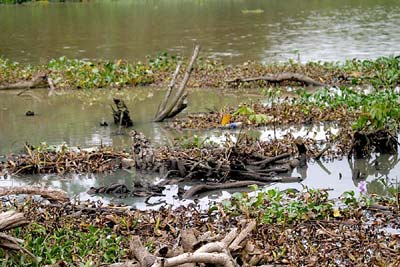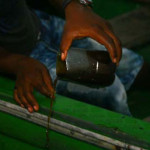Oil
BONGA SPILL: Oil Companies Get New Pollution Regulations

In order to forestall future occurrences of environmental pollutions resulting from oil spill by vessels and platforms operated by oil companies in Nigeria, the Nigerian Maritime Administration and Safety Agency (NIMASA) has gazetted fresh regulations with the Federal Ministry of Justice which will henceforth guide environmental activities in the petroleum industry and maritime industry.
Speaking at an event inLagoslast week, the consultant to the apex maritime regulatory agency on the new regulations, Barrister Emeka Akabogu listed the nine new pollution regulations which essentially apply not just to oil tankers but also to all oil installations.
 The new regulations include; elaborate documentation for the purpose of tracking oil and prevention of oil pollution, prevention of pollution by Dangerous and Nauseous liquid substances (DNLS) prevention of pollution by Harmful Substances in Package Form (HSPF) prevention of pollution by garbage, prevention of pollution by sewage among others.
The new regulations include; elaborate documentation for the purpose of tracking oil and prevention of oil pollution, prevention of pollution by Dangerous and Nauseous liquid substances (DNLS) prevention of pollution by Harmful Substances in Package Form (HSPF) prevention of pollution by garbage, prevention of pollution by sewage among others.
According to Akabogu, part of the new regulation requires that there must be tank segregation in petroleum laden vessels. According to him, operational oil and cargo oils must henceforth be segregated because it is not unusual for some tanks or tankers to have single compartment for carriage of both operational oils and cargo oils.
He also explained that the new law is heavy on technical details and that any shipping company, International Oil Companies (IOC) and ship operator who wants to ensure compliance needs to work a lot with surveyors, marine engineers for the purposes of determining the level of compliance of the vessel that they operate.
“The inspections are going to be more severe from now on as NIMASA now has the full statutory backing to conduct these inspections and to punish offenders of the regulations”
These regulation also provided for the imposition of levies directly on all ships which can potentially pollute the marine environment, Akabogu said that it does not depend on whether the ship has discharged oil or not, he pointed out that every ship that has a minimum of 10 tons of oil on board whether as cargo or for operation it is likely to discharge oil.
“If there is going to be a serious, sustained and regular regime of inspections and preventions of pollutions, it has to be paid for, if there is going to be a regime which ensures that the marine environment is not polluted and there is all kinds of regulated activities then it must be paid for by operator or persons who can potentially cause marine pollutions”
According to him, foreign ships are to now pay a levy per call at the jetties while Nigerian ships (Nigerian registered) are to pay a levy per anum.
Under the new regime, oil receivers or organizations who regularly receive oil as a matter of routine are also subject to payment of a certain amount of money per anum for the purpose of building up the funds which are used is meeting these requirements internationally. “They are subject to compulsory contributions which if not paid will attract penalties” Akabogu stated.
Meanwhile, with the new regulation, Akabogu explained that there is now a very clear regime of detentions with clear benchmarks for the purposes of detentions.
“It is also important to know that where there is oil discharge within Nigerian waters that carries international implications the operators may open to claims not only inNigeriabut outsideNigeria” he said.
Oil
FG Introduces New Incentives To Revitalize Nigeria’s Oil & Gas Industry
In a strategic move to revitalize Nigeria’s oil and gas sector, the Federal Government has unveiled two key fiscal incentives aimed at attracting investment and enhancing energy security.
The announcement was made by Mr. Wale Edun, the Minister of Finance and Coordinating Minister of the Economy on Wednesday.
The first initiative, the Value Added Tax (VAT) Modification Order 2024, introduces critical exemptions for essential energy products and infrastructure, including Diesel, Feed Gas, Liquefied Petroleum Gas (LPG), Compressed Natural Gas (CNG), Electric Vehicles, Liquefied Natural Gas (LNG) infrastructure, and Clean Cooking Equipment.
Read Also: Atiku Calls For Rotational Presidency Across Nigeria’s Geopolitical Zones
These exemptions are designed to reduce living costs for Nigerians, promote energy security, and accelerate the transition to cleaner energy alternatives.
The second initiative, the Notice of Tax Incentives for Deep Offshore Oil & Gas Production, offers new tax relief options for deep offshore exploration projects.
This measure aims to position Nigeria’s deep offshore basin as a premier destination for international oil and gas investments, boosting the country’s appeal to foreign investors.
These reforms are part of a broader set of policy initiatives, known as Policy Directives 40-42, endorsed by President Bola Ahmed Tinubu.
The directives reflect the administration’s commitment to fostering sustainable development in the energy sector and enhancing Nigeria’s competitive edge in the global oil and gas market.
Business
Tinubu set to approve ExxonMobil-Seplat oil deal, expands CNG bus initiative

By Yemie Adeoye
NIGERIA’s President Bola Tinubu has announced that the protracted ExxonMobil-Seplat upstream oil divestment will be formally approved by the Minister of petroleum within a matter of days, just as he announced his government’s intention to expand the Compress natural Gas, CNG buses initiative.
The President who stated this during his Independence day nationwide broadcast stated that the move is in line with his administration’s commitment to free enterprise, free entry and free exit in investments which is the hallmark of his administration investment policy.
“Fellow compatriots, our administration is committed to free enterprise, free entry, and free exit in investments while maintaining the sanctity and efficacy of our regulatory processes. This principle guides the divestment transactions in our upstream petroleum sector, where we are committed to changing the fortune positively. As such, the ExxonMobil Seplat divestment will receive ministerial approval in a matter of days, having been concluded by the regulator, NUPRC, in line with the Petroleum Industry Act, PIA. This was done in the same manner as other qualified divestments approved in the sector.”
The President also seized the opportunity to plead with Nigerians to be patient with his administration’s reform policies. “As your President, I assure you that we are committed to finding sustainable solutions to alleviate the suffering of our citizens. Once again, I plead for your patience as the reforms we are implementing show positive signs, and we are beginning to see light at the end of the tunnel”.
“Our energy transition programme is on course. We are expanding the adoption of the Presidential Initiative on Compressed Natural Gas for mass transit with private sector players. The Federal Government is ready to assist the thirty-six States and FCT in acquiring CNG buses for cheaper public transportation.
Fellow Nigerians, while we are working to stabilise the economy and secure the country, we also seek to foster national unity and build social harmony and cohesion. Our economy can only thrive when there is peace”. he enthused.
Oil
ExxonMobil To Invest $10bn In Nigeria’s Deep-Water Oil Operations
As part of the administration’s push to improve Ease of Doing Business (EoDB), Nigeria’s Vice President Kashim Shettima has expressed support for ExxonMobil’s plan to invest $10 billion in the country’s deep-water oil sector.
Speaking on Wednesday, September 25, 2024, during a meeting with ExxonMobil executives at the 79th United Nations General Assembly (UNGA) in New York, Shettima called the investment “a clear testament to the administration’s economic reforms and investor-friendly policies.”
Read Also: Offset Accuses Cardi B Of Cheating During Pregnancy
This announcement follows news that international maritime company DP World intends to develop a multibillion-dollar port project in Nigeria.
Stanley Nkwocha, Senior Special Assistant to the President on Media and Communications, shared the development in a statement on Wednesday. He quoted Shettima as saying: “ExxonMobil’s potential investment aligns with the vision of President Bola Ahmed Tinubu’s administration for a more investment-friendly Nigeria.
We are committed to fostering an environment that supports such transformative projects.”Shettima also discussed the administration’s broader efforts to improve the ease of doing business, highlighting the “Renewed Hope Agenda,” which aims to simplify bureaucratic processes, enhance transparency, and offer fiscal incentives to attract global investors.
“Our administration has taken bold steps to unify the exchange rate, remove fuel subsidies, and implement tax reforms. These measures, though challenging in the short term, are intended to create a stable and predictable business environment in the long term,” he added.
On the oil and gas sector, Shettima mentioned that the government is revising the fiscal framework for deep-water operations to attract investment while ensuring fair returns for the Nigerian people.











